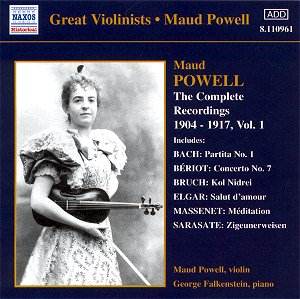Although she is almost unknown today, Maud Powell (1867 - 1920) was a household name throughout America, and was widely recognised as the first great American virtuoso. Born in Peru, Illinois, to a diversely academic, political and adventurous family (her immediate relatives included an educationalist, an explorer and several suffragettes), Powell was raised as a prodigy, and made her New York debut at 18 after periods of study with Schradieck, Dancla and Joachim. An energetic and committed artist, Powell performed with all the great American and European orchestras of her time, and was personally acquainted with many great contemporary composers. Her success as a virtuoso was influential in the expansion of classical music listening in America, and she set a new standard for violin performance.
So why is such a master of the violin almost unknown today? The tragic answer is that she died in 1920, five years before the invention of electric recording. Correspondingly, her only surviving recordings are exclusively products of the 'recording cylinder', a primitive recording studio consisting of a large funnel into which the artist had to perform. Powell herself once admitted to "never [being] as frightened as I am when I stand in front of that horn to play", and with good reason; the absence of editing technology at that time meant recordings could only be made in whole takes. As Powell put it, "[there's] a ghastly feeling that you're playing for all the world and that what is done is done".
Powell rises to the challenge though; despite the constant crackles, her warm, seductive tone always reaches out through the constraints of her recording medium. Producer Ward Marston deserves praise for such an effective re-mastering of the Victor Red Seal originals; inevitably a difficult task. Only when background problems are reduced so that there is barely any distraction from the artist's tone can re-mastering be seen as a success, and here it is a resounding one.
The disc itself is a classic mixture of violin concert pieces. Bach's 1st partita [extract] is appropriately crisp and dancelike, and the succulent, inviting tone that seems to be a hallmark of Powell's playing is immediately evident. Her playing does not have the brilliant sheen of, say, Heifetz - it is instead a warmer sound, similar to that of Kreisler. Bruch's Kol Nidrei is a case in point - even the higher registers of the violin sound full-bodied and engaging, and her tone becomes dark and foreboding at the most expressive moments. Stylistically, Powell seems to err on the side of safety - she is always tasteful and never outrageous - though this caution may stem from the restrictive recording conditions that she suffered. She always holds the listener's interest however; the two items by Gluck - one arranged by Powell herself - include much use of portamento, as does her loving rendition of that old favourite Salut d'amour, and she is not afraid to use agogics to a refreshingly exaggerated degree (there is often an underlying sense of humour in her interpretation). Beriot's Violin Concerto No. 7 - the most substantial work on the disc at [12.55], is a thoughtful and well-proportioned interpretation, but it would be interesting to know how Powell adapts to more large-scale works.
Whilst predominantly a player of great charm, Powell also demonstrates that she can be as dextrous as any of the great virtuosi with her spirited rendition of Zigeunerweisen, (admittedly truncated, presumably to fit onto an original analogue disc). Schubert's Bee and other fast-paced items such as Sauret's Farfalla and Caprice on Dixie by Emmet/Bellstedt also show great aplomb and technical mastery; in contrast, the poise and beauty of the final track - Massenet's hackneyed Méditation (from Thaïs) - is so touching that the hyperbole of the sleeve notes ('one only has to listen to grasp the power she had over her audiences… she is completely in command of her instrument… totally en rapport with the music… a master whose genius would propel her to the top today just as it did then') seems justified.
At Naxos price, this little piece of violin history is too affordable to miss. Highly recommended.
Simon Hewitt Jones

